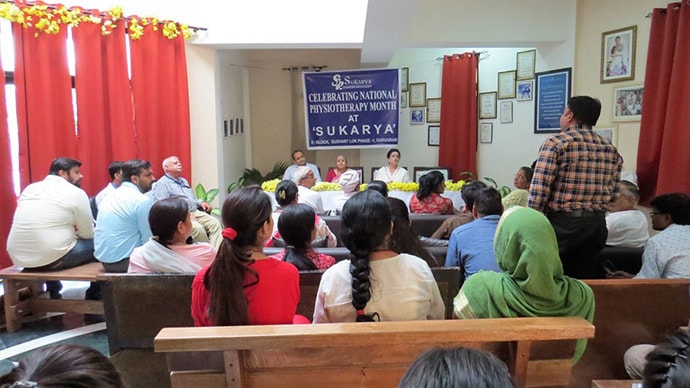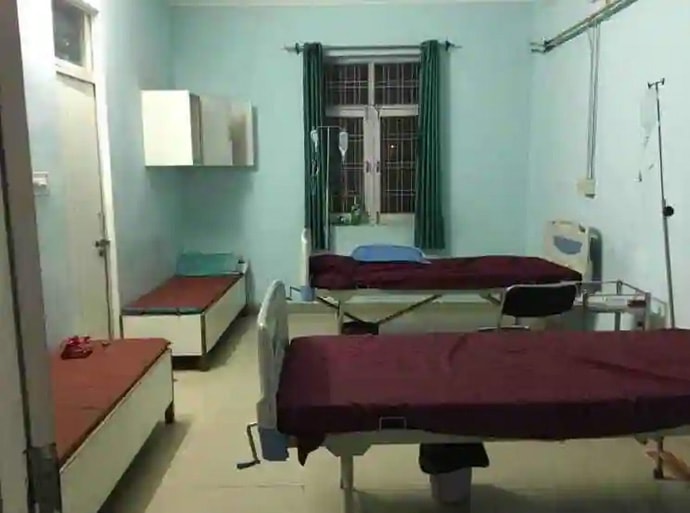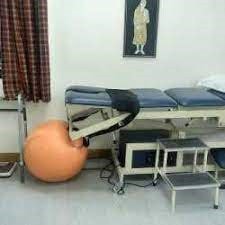By Debadutta Dash, Sukarya USA

Sukarya Physiotherapy & Rehabilitation Centre. Photo: Sukarya
Abdul, a barber, runs a small shed in the Saraswati Kunj slum community with a mirror, chair, and few scissors. He says he migrated from Bengal in 2000, and after many attempts to find a job, he set up a shop independently. When his son had a fever, which didn’t go for a while, a field worker from Sukarya approached him and told him about the clinic and medical facilities in the locality. There he came across the physiotherapy unit and got counseling for the first time for his problems with arthritis. Since then, he has received medical aid from the organization for himself and his son and now calls it his family home.
Moushumi, a resident of the same Saraswati Kunj slum, was nine months pregnant with her second child. Before her interactions with Sukarya, Moushumi was clueless about pre/post-natal care, the importance of eating right during pregnancy, immunizations, etc. However, with the organization’s help, she overcame the problems of conceiving the first time and now carries her second child confidently.
Most of the slum-dwellers are domestic workers and manual laborers. It’s common to find them suffering from musculoskeletal problems like arthritis. Injuries due to occupational hazards are rampant too. For such people, having access to a physiotherapy clinic is rare. To address this issue, Sukarya set up a full-fledged physiotherapy unit on its premises and started providing services free of cost to the poor or at a subsidized rate for those who could afford them with the help of local physiotherapists. The Physiotherapy clinic started to manage pain-related issues of poor women working in residential colonies or slums.

Physiotherapy & Rehabilitation Centre treatment room. Photo: Sukarya
It can be a common misconception that physiotherapy benefits only people recovering from an illness or injury. However, physiotherapy is ideal for supporting people with disabilities to participate in required physical activities. For example, supporting anyone with an intellectual disability to access the local physiotherapy unit may mean meeting the World Health Organization’s recommendation of 150 mins of moderate physical activity per week. This improves their health, enabling them to make friends and increase their safety as people in their local community get to know and look out for them.
Even though Maternal-Child Health & Nutrition have been the focus area of Sukarya since 1998, Sukarya opened its Physiotherapy & Rehabilitation Centre on 15th August 2005. It was a step taken by the leadership team of Sukarya to emphasize the importance of physiotherapy as an effective treatment and its preventive role in conditions that affect an individual’s musculoskeletal system, like arthritis or injuries by accident. Moreover, Sukarya allowed physiotherapists to support people with non-physical needs. For example, people diagnosed with Autism, psychosocial, or intellectual disabilities could benefit from physiotherapy center.

Treatment table and equipment. Photo: Sukarya
The possibilities were endless, and the clinic was spacious, well-equipped with the latest physical therapy equipment and a qualified and experienced physiotherapist on duty. https://youtu.be/KIrjh7bj578. Unfortunately, the Physiotherapy unit closed its door in February 2023 after almost 18 years of meaningful existence due to a lack of consistent funding support. At the same time, there was a growing need to expand the outreach for maternal-child health and nutrition services among the underprivileged. Interested funding parties may contact Sukarya at Sukarya@Sukarya.org to restart the physiotherapy unit.
People like Abdul and Moushumi, who received treatment from Sukarya, became evangelists and spread the word amongst their friends in other slums. Sukarya continues to provide quality health services to the underprivileged of the Saraswati Kunj slums of Gurgaon. With a population of more than 10,000, the slum consists of migrant workers from West Bengal (60%), Uttar Pradesh (20%), and Bihar (20%). Many people still do not have access to essential quality healthcare services. Government health centers are far away, and the costs incurred in traversing these distances, coupled with the unpredictability of finding a provider at the center, push most people to quacks. Through Swasthya Kendra, the clinic located on campus, Sukarya provides the entire gamut of primary health services.
A physician runs the clinic twice weekly (Mondays and Thursdays) for four hours and provides medical checkups and medicines. In addition, the center is supported by a strong community outreach program where a community health worker conducts home visits to build awareness about critical health issues like nutrition, personal hygiene, and sanitation. The community health worker also sends people requiring help to the center and follows up with those undergoing treatment to ensure they recover completely. Other duties undertaken by health workers include counseling women on antenatal care, breastfeeding, the importance of institutional delivery, anemia control, etc.
While providing quality health services is integral to their work, the second and perhaps more critical component is a change in behavior and attitudes through awareness sessions, counseling, and continuous interaction. Awareness camps also educate women on the importance of adequate nutrition, immunizations, pre-and post-natal care, and institutional deliveries.
Over 10,000 people like Abdul and Moushumi have benefited from Sukarya’s Healthcare program. Its cradle-to-grave approach to natal care (medication, regular checkups, and nutrition after a child is born) is commendable.
* * * * * * * * * *
Sukarya helps educate and empower marginalized children, adolescent girls, and women by giving them access to non-formal education, primary healthcare, and economic opportunities while ensuring gender equality at the grassroots level through Sukarya’s programs in more than 600 villages and 100 slums in Delhi, Haryana, and Rajasthan in India. Sukarya is a women-led, women-centric, and GuideStar India Platinum level grassroots level NGO established in 1998. sukarya.org